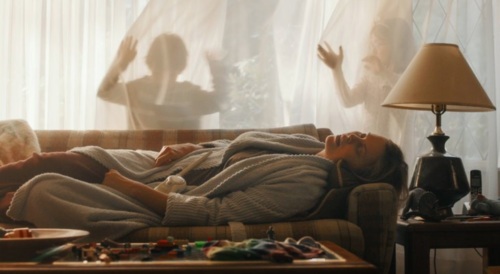One of the few enviable human qualities is a predilection to kick into survival mode and the ability to move on from shattering traumas. We’re quite similar to snakes in that way. Our likenable skill of shedding one skin in order to move on somewhat seamlessly into a new phase of life is not without its agonies, however (whereas snakes seem to make it look all too easy). Marlo (Charlize Theron) is very aware of this as she struggles to find the will to exude any form of energy beyond simply waking and showing up to where she needs to be with her two kids, Sarah (Lia Frankland) and Jonah (Asher Miles Fallica), the latter of whom presents her with additional maternal challenges due to his as of yet unclassifiable by doctors developmental issues. In the background of the static white noise that is her husband, Drew (Ron Livingston, always ideal in the role of clueless significant other), who has deep-seated resentment issues toward Marlo’s affluent brother, Craig (Mark Duplass), who both butt heads over Marlo’s mental well-being.
Unlike Cody’s previous, “edgier” work, Tully actually tends to come across as far grittier, in large part due to its pacing and gradual buildup to the final payoff, and the fact that we’re dealing with a woman who is struggling to let go of the idea of her past self, the one that never would’ve imagined she could end up in such a boring existence, despite the fact that this was what she wanted for her children–to give them the opposite environment that she had while growing up. As Craig puts it to her, “I wasn’t always a rich asshole. I grew up in that same shitty house as you did. Same shitty parents, same shit brown Buick.”
Marking Cody’s second collaboration with Theron after 2011’s Young Adult (which also explored a sort of inverse ennui to being forever childless), the sense of longing and wasted potential that Jason Reitman (directing his third Cody screenplay) pulls from her once again as he did in that film reaches a crescendo of complacent sadness that must be turned into semi-jubilant acceptance if Marlo is to function with the addendum of a third child.
After another brutal meeting with Jonah’s principal, Marlo goes to a coffee shop to take a rare moment to herself, interrupted by her old roommate from Bushwick, Vi, recognizing her. Explaining that she’s in town for a memorial for her friend’s father, Vi is incredulous to learn that Marlo actually lives in this suburban hellscape, whereas she has opted to continue living in the Neverland of Bushwick in the same loft that they once shared together. And as she invites Marlo to call her at the same number she had nine years ago sometime, she quips, “I should get this coffee home before it gets as cold and black as my womb.” The impression Vi leaves on Marlo is apparent, putting her in a more reflective and comatose mood than usual.
Post-birth of Mia, she does finally surrender to calling the night nanny recommended by her brother, Tully (Mackenzie Davis), as though she’s ready to ease into that so-called semi-jubilant acceptance. Much to her surprise and delight, with Tully, the house is spotless, Minions cupcakes are baked and everything appears generally more manageable. Gone are statements like, “I feel like an abandoned trash barge,” as well as Marlo’s formerly slovenly appearance as she starts wearing makeup again (in true Cody fashion, inspired by Ladies and Gentlemen, The Fabulous Stains).
Cody (the original Greta Gerwig, lest you forget) is no stranger to wielding the metaphor of pregnancy as one’s own form of rebirth, herself a mother of three children (not a coincidence when you look at her historic penchant for the autobiographical). She even did the same with the subject of teen pregnancy in Juno. But with every rebirth comes the loss of a version of yourself you might find difficult to part with. Mainly because each time we shed our skin, we’re forced to lose just a little bit more of our innocence. A little bit more of our faith in dreams we once held dear and imagined we could never give up.
The more attached Marlo grows to Tully, the more dangerous the liaison, ultimately echoing shades of Fight Club. As Tully puts it to Marlo after essentially breaking up with her on an impromptu night of drinking back in her old stomping grounds of Bushwick, “I was just here to bridge a gap. It’s time for me to move on.”
Marlo balks at her and warns, “I bet you have big plans. I mean your twenties are great. They are. But then your thirties come around the corner like a garbage truck at 5 a.m… What are you going to do when this whole free spirit thing stops being charming and it just starts to look ugly?” It is obvious, of course, that Marlo is talking only to herself, criticizing only herself and the life she’s ended up with. It wasn’t supposed to be this way, we all think to ourselves. But like any snake, we know when it’s time to let go. That’s what Tully ultimately seeks to comfort us with. No matter how terrible one’s state of existence, renewal and repair is possible. Molt the pain away.





















